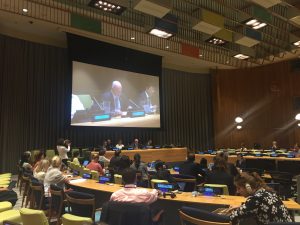As delivered
Closing remarks for the first Informal Interactive Multi-stakeholder hearing of the preparatory process for the global compact for safe, orderly and regular migration and the intergovernmental conference on international migration
26 July 2017
H.E. Mr. Jose Gómez Camacho,
Secretary-General of the Intergovernmental Conference on Migration Ms. Louise Arbour,
Excellencies,
Distinguished guests,
Ladies and Gentlemen,
Many thanks to all of you who have participated in today’s Informal Interactive Multi-stakeholder Hearing.
The breadth of stakeholders, regions, and perspectives that have participated, has greatly enriched the quality and depths of our discussions.
Throughout today’s Hearing we heard participants – including Member States, expert panellists, and representatives of the UN, NGOs, business, labour unions, and national human rights institutions alike – speak of the urgent need for a cooperative global approach in addressing human mobility and international migration.
We had the benefit of civil society participants sharing individual stories of migration from around the world. They reminded us of the harrowing realities that many migrants face.
We heard academics speak of the work they are undertaking, and the findings of their studies on wide-ranging issues relating to international migration.
We listened to parliamentarians reflect on the difficult political debates that are being held in national parliaments across the world on specific migration policies.
And we learned of how labour migration is of fundamental importance to business entities and the private sector.
Throughout the day, particularly rich discussions were held on the four thematic areas of focus for the multi-stakeholder hearing, with a number of key messages emerging.
All participants spoke of the valuable contributions migrants have made to societies and to nations around the world – socially, culturally, and economically.
They underlined that the fundamental human rights applicable to all people are also shared by migrants. There was a useful discussion held on specific ways we can ensure the human rights of migrants are protected, including through programmes to counter xenophobia and promote social inclusion.
They spoke of the importance of bringing a gender perspective to migration issues, including the need to recognise and respond to the special challenges faced by women and girl migrants.
Participants underlined the complexity of addressing the many drivers of migration, and the need for a cross-cutting approach to be pursued that addresses the interconnection between migration, sustainable development, and sustaining peace.
Valuable new insights were also shared on the mutual benefits to be gained from improving cooperation between countries of origin, transit and destination.
The importance of remittances – which represent the largest source of external finance for many developing countries – was particularly highlighted; as was the need to recognise the multi-faceted nature of the positive contributions of migration which cannot be measured in economic terms alone.
Discussants raised existing political and practical impediments that need to be addressed in order to improve international cooperation and governance of migration.
They addressed the potential for innovation and technology to be used to help overcome some of these hurdles.
Speakers underlined the need for migration to be seen in the context of the broader multilateral agenda, including the interconnection between migration and sustainable development – both in terms of the drivers of migration, and the contribution of migrants to achieving sustainable development.
And many participants called for a robust follow-up and review mechanism on implementation of the Global Compact, including for it to be linked to follow-up of the 2030 Agenda on Sustainable Development.
The views, experiences and expertise that have been shared today have greatly enriched our understanding of a number of key issues that go to the heart of forging a global compact for safe, orderly and regular migration. They have looked at human mobility and migration cooperation in a comprehensive and humane way.
We have clearly seen the need to improve international cooperation and governance of migration based on the recognition of migrants as both holders of human rights and agents for sustainable development.
Excellencies, Ladies and Gentlemen,
In the coming weeks my Office will prepare a President’s Summary of today’s meeting which will be transmitted to all Member States and made available on the dedicated website for the preparatory process.
The President’s Summary will also serve as an input to help inform the intergovernmental negotiations of a global compact for safe, orderly and regular migration.
In closing, I once again thank everyone for their active and constructive participation throughout this day’s work.


